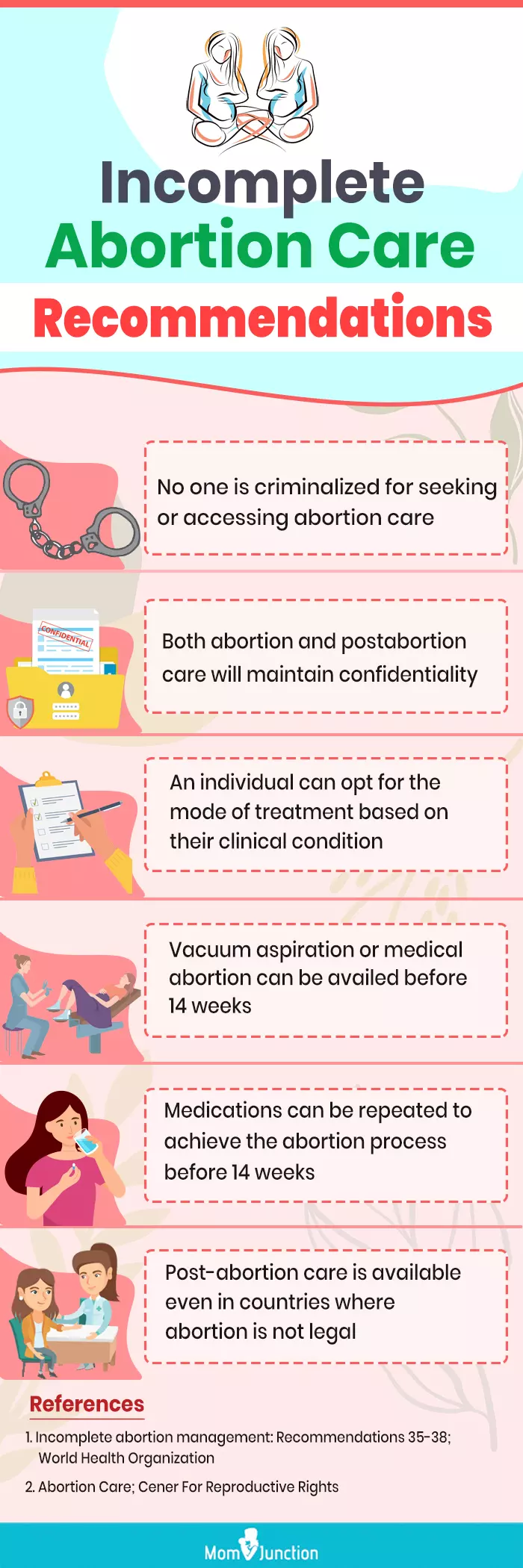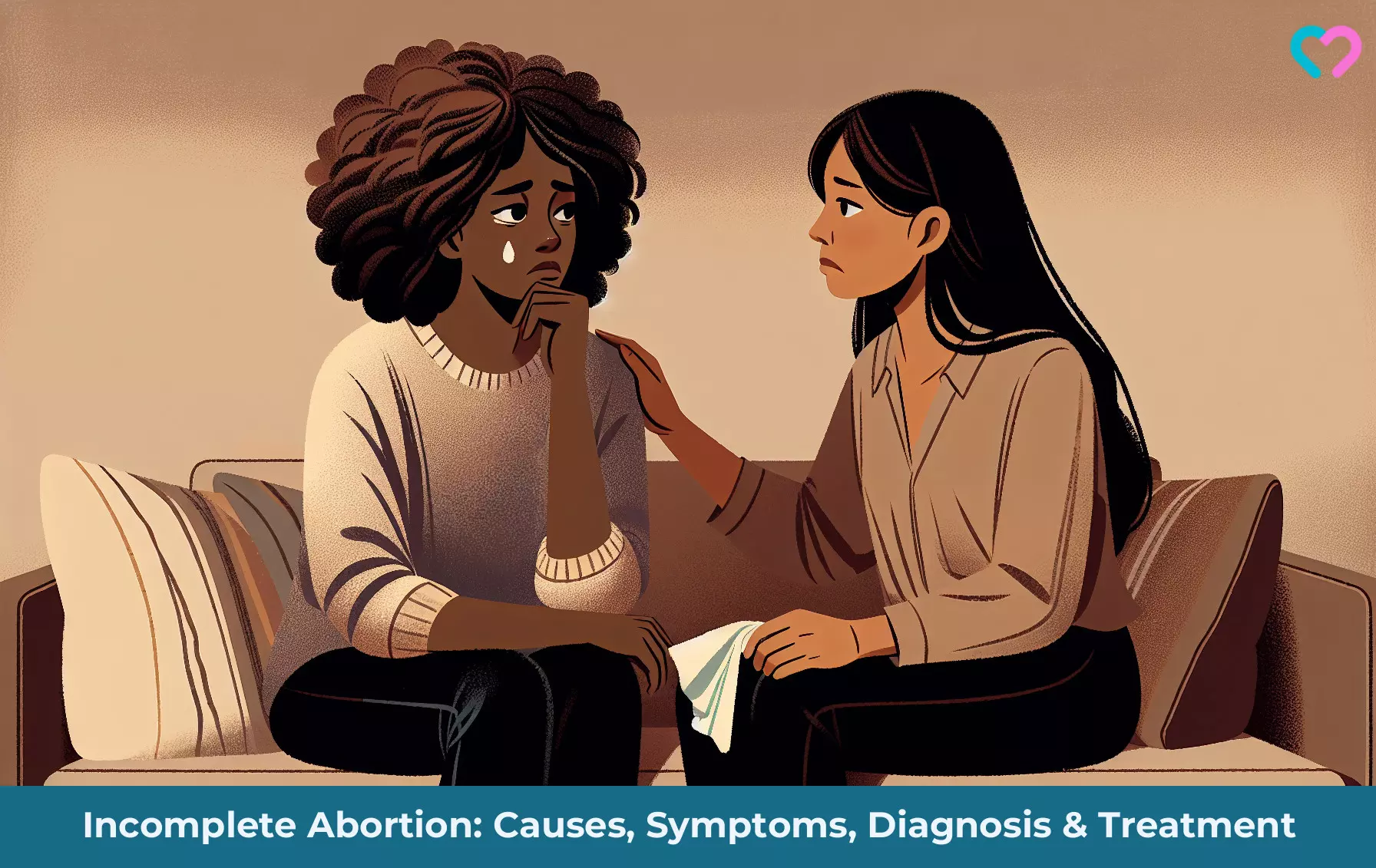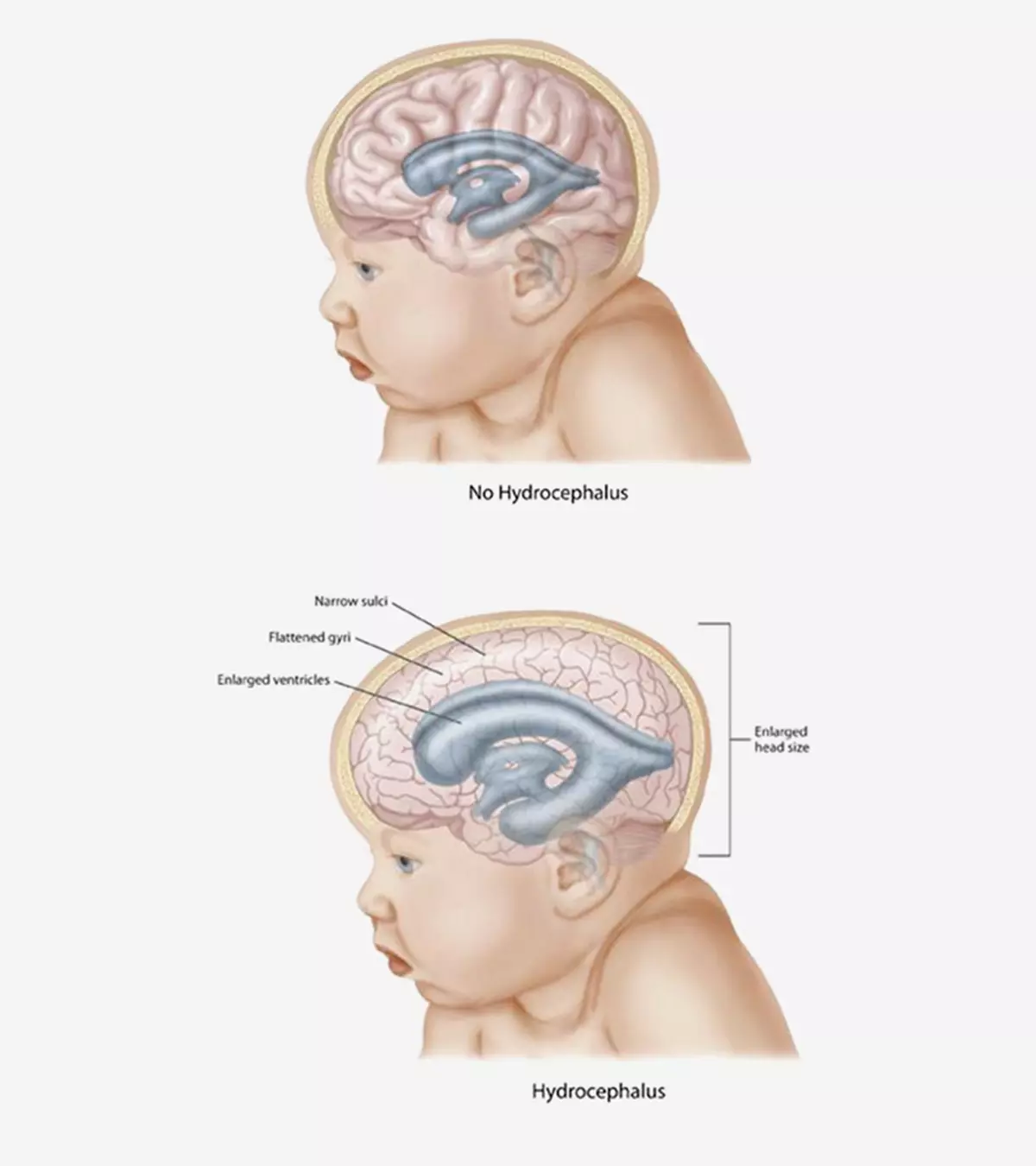
Image: Shutterstock
An incomplete abortion or incomplete miscarriage is when some products are held back in the uterus after a miscarriage (1).
It is also referred to as spontaneous abortion. The products of conception retained in the uterus do not have viable fetuses. This implies that there is no possibility to continue the pregnancy after an incomplete abortion.
It is essential to recognize the signs early for timely medical intervention and to prevent complications. The right diagnosis helps ensure complete expulsion of the tissue remains left in the womb after an abortion.
Read this post to know about the causes, risk factors, symptoms, diagnosis, treatment, and complications of incomplete abortion.
Key Pointers
- Incomplete abortion is a condition where some fetal material remains within the body.
- Symptoms of incomplete abortion are pain, cramps, excessive bleeding lasting more than a few days, high fever, or dizziness.
- It can be treated by surgical evacuation and medical management such as misoprostol.
How Common Is Incomplete Abortion?
There is no global statistical data on incomplete abortion since abortion is legalized in some countries and may go unreported in a few countries.
A comprehensive study on medical abortions divulged a significant surge in complications at less than 12 weeks. The rate of complications shot up from 4.2% to 8.2% between 2008 and 2015. An incomplete abortion, marked as the most common complication, was observed in 57% of all medical abortions. The graph below shows the frequency of incomplete abortion as a complication in medical abortions from 2008 to 2015. Through the years, its numbers dwindled, yet it remained the most common complication.

The prevalence of complications in medical abortions
Source: Complications related to induced abortion: a combined retrospective and longitudinal follow-up studyWhat Are The Risk Factors And Causes Of Incomplete Abortion?
Approximately 50% of incomplete abortions can be due to chromosomal anomalies in the fetus, and they are not preventable.
Other causes and risk factors for incomplete abortion could be (2):
- Maternal diseases such as diabetes, renal diseases, thyroid problems, lupusiAn autoimmune disease that is inflammatory in nature. , hypertension, thrombophiliaiA condition where blood forms clot easily. , and polycystic ovarian syndromeiA hormonal disorder characterized by high levels of male hormones in female bodies leading to multiple cysts on the ovaries.
- Abnormalities of uterus
- Exposure to teratogensiSubstances that cause fetal abnormalities upon exposure during pregnancy. such as radiation, toxins, drug, alcohol, or excessive caffeine
- Infections such as sexually transmitted infections (STIs), listeriosis (caused by bacteria Listeria monocytogenes), and human immunodeficiency virus infection
- Overweight or underweight

- Advanced maternal age
- Hydatidiform moleiA rare uterine mass present at the start of pregnancy.
Some of these causes and risk factors can also result in congenital anomalies, leading to incomplete abortions. Incomplete abortions are more common with advanced maternal age since the risk of chromosomal abnormalities is higher in pregnancies with advanced maternal age. However, young women can also have an incomplete abortion if any other risk factors or causes are present (2).
Less reported causes of incomplete abortions may include (2):
- Illegal abortions
- Lack or poor prenatal care
- Pelvic or lower abdominal trauma
Rarely, incomplete abortions can also occur after a medical or surgical abortion (2). Here, remaining pregnancy tissue will not be completely passed after medical abortion or removed during a surgical abortion. It happens more often after medical abortion than surgical abortion.
 Quick fact
Quick factWhat Are The Signs And Symptoms Of Incomplete Abortion?

Moderate to severe vaginal bleeding and pelvic or lower abdominal pain are common symptoms of incomplete abortion.
The other symptoms you may notice after a few days of abortion are (3):
- Pain lasting more than a few days
- Excessive bleeding lasting for a few days
- Severe pain or cramps
- Discomfort or pain while pressing on the abdomen (belly)
- High fever lasting more than a day or two
- Symptoms of low blood pressure such as dizziness
- Persistent foul odor from vaginal discharge
You may contact an obstetrics and gynecology specialist if you have any symptoms of incomplete abortion since early medical care is essential for better outcomes.
 Things to know
Things to knowHow Is Incomplete Abortion Diagnosed?
Symptoms and soft uterus on the bimanual examiA two-handed pelvic exam performed by a doctor to assess the size and location of organs. by a doctor can suggest a diagnosis of incomplete abortion. The following tests are ordered to confirm the diagnosis of incomplete abortion (2):
- Human chorionic gonadotropin (hCG) levels in the blood. Usually, hCG levels are low after a few days of an abortion.
- Transabdominal or transvaginal ultrasound helps visualize retained products of conception in the uterus.
- Blood analysis, including complete blood count, blood type, and coagulation profile, can detect Rh factor, risk of bleeding, etc.
These diagnostic tests are necessary before treating an incomplete abortion since similar clinical presentations can be seen in ectopic pregnancy.
How Is Incomplete Abortion Treated?
Treatment for incomplete abortion may vary depending on the clinical presentation and gestational age. However, medical or surgical interventions are usually recommended to evacuate retained products of conception (ERPC)iA procedure to remove conception products from the womb following an abortion or miscarriage. . Treatment strategies based on the clinical scenario may include (2) (4) the following:
- Surgical evacuation is recommended for women with heavy bleeding and signs of infection. Vacuum aspirationiAn abortion procedure that removes the fetus/embryo through the cervix using a vacuum. or curettage procedures are used to remove the retained products of conception (POC). Medical management is not recommended for unstable patients.
- Incomplete abortions in stable cases are treated with medical management using misoprostoliA medication used to treat stomach ulcers, induce labor, or cause an abortion. or surgical procedures depending on resources and women’s preferences.

- Doctors may recommend expectant management in early pregnancy failure (EPF). This is waiting for the natural passage of conception products. Usually, the POC is passed within one to four weeks of pregnancy failure after embryonic death. Medical or surgical interventions are suggested if the natural passage is delayed or has complications.
- Blood transfusion and medication are often required for women with severe bleeding.
- Oxytocin is given to help control bleeding caused by uterine atony.
- Rh immune globulin injections are given in cases of Rh incompatibility to help prevent complications in a future pregnancy.
- Products of conception fragments from the cervical opening are removed with forceps to help prevent cervical shock.
- IV fluids and pain medications are given if needed.
Reproductive health is often not compromised in cases of incomplete abortions, and the prognosis is generally positive after proper management. There is an 80-96% success rate with no future fertility problems. Also, there are no major differences between outcomes of expectant and medical management of incomplete abortion when gestational age is less than 12 weeks.
 Quick fact
Quick factWhat Are The Complications Of Incomplete Abortion?
Untreated incomplete abortion may lead to various complications and affect maternal health (2):
- Severe bleeding and hemorrhagic shock (poor oxygen supply due to blood loss)
- Sepsis (blood infection) due to incomplete septic abortion and septic shock (low blood pressure due to sepsis)
- Cervical shock is a vasovagal effectiThe body's reaction, such as fainting due to triggers due such as the sight of blood or intense emotions. , causing bradycardia (slow heart rate) and hypotension (low blood pressure) due to products of conception in the cervix.
There is a 3.4% increased risk of poor prognosis if the gestation age is more than 12 weeks. Increased uterine size, fetus size, and blood supply could be the reasons for unfavorable outcomes in advanced weeks of gestation (2).
Common complications of incomplete abortions after 12 weeks may include (2):
- Sterility
- Maternal death
The risk for serious complications, including maternal death, is more after 14 weeks of gestation. Lack of adequate medical care and delaying seeking medical care are common reasons for severe complications (2). It is recommended to seek medical care from approved healthcare providers since inadequate procedures could result in uterine rupture, uterine perforation, pelvic infections, and cervical damages.
How To Cope With Incomplete Abortion?
The following coping strategies can help you deal with emotional issues related to incomplete abortion (5):
- You may understand that miscarriage is common, and it often occurs when there is a genetic abnormality or other problems that prevent normal fetal development. Surgical and medical abortions are also done in circumstances when there is a certain risk.
- Know that everyday activities such as working, exercising, and having sex do not cause miscarriage, and do not blame yourself for pregnancy loss.

- Understand that emotions can be due to sudden hormonal shifts in the body. A sudden drop in pregnancy hormones leads to a roller coaster of emotions.
- Most experts recommend grieving your loss and overcoming it.
- Coping as a couple is necessary to recover from pregnancy loss. Men can also be emotional about pregnancy loss and feel sad or guilty. Avoid blaming each other, support and open up.

- Seek counseling and support group.
What Is The Difference Between A Complete Abortion And An Incomplete Abortion?
When everything from a miscarriage has come out of the uterus, it’s called a completed miscarriage. The bleeding and pain should go away quickly. An ultrasound or a surgical procedure called dilation and curettage (D&C) can confirm a completed miscarriage (6). If it is a complete miscarriage, you usually will not require medical help.
An incomplete miscarriage is when a miscarriage starts, but not everything from the pregnancy comes out (7). You might feel pain in your abdomen or back and see bleeding when your cervix is open. If the cervix dilates or effaces, or if the membranes rupture, a miscarriage is unavoidable. If the miscarriage isn’t complete, you may still have bleeding and cramps (6).
Seek healthcare professionals’ advice to plan the next pregnancy. Although it is safe to conceive after one normal menstrual cycle, some women may require certain medical tests to determine the cause of incomplete abortion. This may help prevent future pregnancy loss. It is also advised to wait until you are physically and emotionally ready to conceive again.
Frequently Asked Questions
1. How long does it take for an incomplete abortion to pass?
It can take weeks for an incomplete abortion to pass. However, if misoprostol is used, the tissue usually passes within a week. It is advisable to consult a doctor when using any medications (8).
2. Can antibiotics treat incomplete abortion?
Women seeking treatment for an incomplete abortion usually have problems due to excessive bleeding or infection. Antibiotics cannot treat an incomplete abortion but may prevent or treat infections. Single-dose antibiotics may be more suitable if it is difficult to follow a continued antibiotic regimen (9).
3. What is Misoprostol dosage for incomplete abortion?
A sublingual dose of 800 micrograms of Misoprostol may effectively treat an incomplete abortion (10). However, the dose may vary and is best ascertained by a doctor.
4. What antibiotics can be used for incomplete abortion?
Antibiotics such as Doxycycline and Metronidazole may be given prior to surgical completion of abortion to reduce the risk of pelvic infections (11).
Incomplete abortion is when the products of conception are not fully expelled from the uterus after an abortion or miscarriage. This may result in abdominal pain and bleeding a few days after abortion or miscarriage and require medical attention. Retained uterine pregnancy products can lead to life-threatening complications such as the increased risk for disseminated intravascular coagulation. To prevent such complications, it is advisable to seek medical assistance for induced abortion with medication or undergo a termination procedure to remove the contents of the uterus. Seek counseling to cope with pregnancy loss and make informed and right clinical decisions for yourself.
Infographic: WHO Recommendations On Incomplete Abortion Care
According to human rights organizations and courts worldwide, abortion care is a fundamental right of a woman or a girl. Healthcare providers are obligated to provide high-quality abortion care. Go through the infographic to know WHO recommendations on incomplete abortion care.

Illustration: Momjunction Design Team
Illustration: Incomplete Abortion: Causes Symptoms Diagnosis & Treatment

Image: Dall·E/MomJunction Design Team
References
- Miscarriage.
https://medlineplus.gov/ency/article/001488.htm - Ashley Redinger and Hao Nguyen; Incomplete Abortions.
https://www.ncbi.nlm.nih.gov/books/NBK559071/ - How do you know if you have an incomplete abortion?
https://www.womenonweb.org/en/page/477/how-do-you-know-if-you-have-an-incomplete-abortion - Incomplete Abortion.
https://www.sciencedirect.com/topics/medicine-and-dentistry/incomplete-abortion - Coping with Miscariage.
https://www.stanfordchildrens.org/en/topic/default?id=coping-with-miscarriage-1-4036 - Symptoms & Signs of Miscarriage.
https://americanpregnancy.org/getting-pregnant/pregnancy-loss/signs-of-miscarriage/ - Types of miscarriage.
https://www.tommys.org/baby-loss-support/miscarriage-information-and-support/types-of-miscarriage - Common Treatments for Miscarriage.
https://www.aafp.org/pubs/afp/issues/2011/0701/p85.html - Antibiotics for incomplete abortion.
https://www.cochranelibrary.com/cdsr/doi/10.1002/14651858.CD001779.pub2/full - Use of Misoprostol to Treat Incomplete Abortion Should Be Limited To the First 12 Weeks of Pregnancy.
https://www.guttmacher.org/journals/ipsrh/2014/12/use-misoprostol-treat-incomplete-abortion-should-be-limited-first-12-weeks - David Lissauer et al.; (2018); Prophylactic antibiotics to reduce pelvic infection in women having miscarriage surgery – The AIMS (Antibiotics in Miscarriage Surgery) trial: study protocol for a randomized controlled trial.
https://trialsjournal.biomedcentral.com/articles/10.1186/s13063-018-2598-3 - Rh-Negative Blood Type and Pregnancy.
https://midwife.org/acnm/files/ccLibraryFiles/Filename/000000003906/Rh_negative_blood_pregnancy.pdf
Community Experiences
Join the conversation and become a part of our nurturing community! Share your stories, experiences, and insights to connect with fellow parents.
Read full bio of Dr. Mona Hardas
Read full bio of Dr Bisny T. Joseph
Read full bio of Rebecca Malachi
Read full bio of Reshmi Das

















